Last Updated on February 26, 2024 by Kirsten Raccuia
When Mark and I first started dating, we discussed having children. It was not something I ever imagined for me. Truthfully, I never imagined being married. But after 17 years, I can honestly say that letting Mark talk me into marriage was the best thing I ever did! Kidding! He was the best decision I’ve ever made!
But I digress.
I love other people’s kids. But I never had the burning desire to be a mother. Without that aspiration, why have kids? Because you’re supposed to. Because it’s just what you do? Well, I’ve never been one to follow the norm.
Plus, I thought I would be a neurotic hot-mess of a mom.
However, since living in Malaysia and traveling throughout Southeast Asia, we’ve met a lot of expats and digital nomads that are raising multicultural kids. You know the ones. The ones that have lived in 4 countries by the time they are 10. Maybe they have two passports. They speak two to three languages.
These are global kids, children of the world. And I think that is the best kind of education you can give a child.
And before you think to yourself, “How the hell is Kirsten going to write about parenting and multicultural kids?”
Let me answer you.
I am not. What the hell do I know?
That’s why I’ve reached out to a bunch of my blogger friends who are expats raising multicultural kids. These are their stories…
1. Chelsea from Pack More Into Life
“Within a year, he looked more like a little German child rather than an American one.”
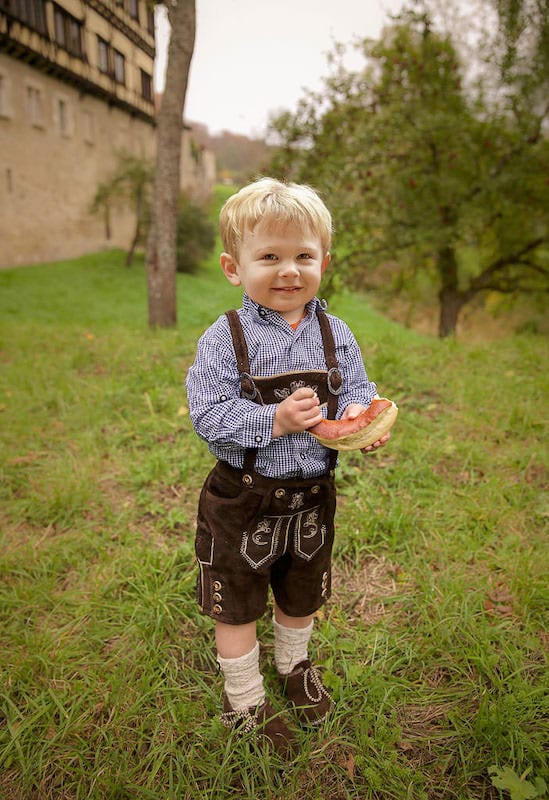
Being a military family, we have the opportunity to live around the world. With that privilege also comes a unique set of struggles with raising children in various cultures and locations.
When our son was a toddler, we moved to Stuttgart, Germany. It was quite the change from the hustle and bustle of the DC area in the US, but it also gave us the opportunity to slow down and soak up the family-friendly German culture.
Unlike most military families, we lived in a small town located close to Tubingen. We had a typical German style home with heated flooring and a large yard with a fence surrounding the property. We were walking distance to the bakeries, forest trails, and my favorite, an ice cream store with unique flavors.
Our son was also the perfect age to start kindi. We lucked out with a waldkindi in our town. Waldkindi is an outdoor preschool where the children go out in all sorts of weather and play in the forest with tools, shovels, ropes, and their imagination. There are limited buildings, and they use a campfire to help stay warm in the winter. The children walk just under a mile each day out into the woods where they have a snack, sing songs, work on projects and spend time in a mixed age group.
The waldkindi was such a fun and unique opportunity for our son and he thrived. He learned the German language, adapted to the cultural differences between American and German children, navigated social encounters in a mixed age group, and learned how to use a knife to whittle wood at the age of 3. Within a year, he looked more like a little German child rather than an American one. Living overseas with young children is the perfect opportunity for them to gain language acquisition, assimilate into new environments, and make a variety of friends.
2. Nick from Spiritual Travels
Expat Life in Taiwan with Kids
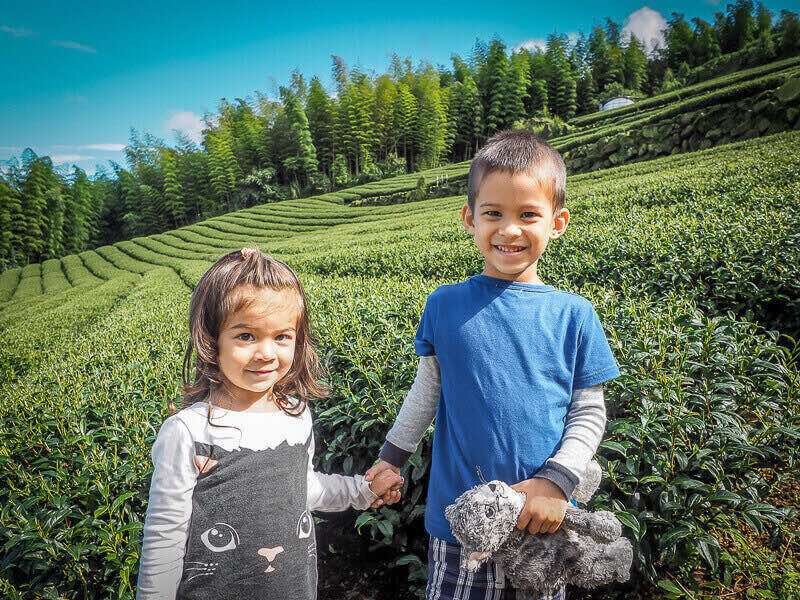
Eleven years ago, I moved from my native Canada to Taiwan as an English teacher. Shortly after, a Taiwanese woman approached me on the MRT to strike up an awkward conversation. Four years later we were married, and Sage and Lavender entered this world.
Meanwhile, Emily and I transitioned from teaching to writing work, freelancing for local textbook publishers and me creating a successful travel blog.
Born and raised in Taiwan, our kids were dual citizens from birth, both on paper and culturally. We had a bilingual household, celebrated Christmas and Lunar New Year, and ate hummus and Chinese steamed buns in the same meal without thinking twice.
Knowing that we would eventually move to Canada, we helped our kids absorb as much of Taiwan’s language and culture before we left. Simultaneously, we established close relationships between the kids and their relatives in Canada through talking about them often, regular Skype calls, sending gifts, and putting photos of them up in our home.
Our kids were too young to understand their situation, but we tried to explain it to them. Around the time we left in 2019, when Sage was five and Lavender was four, they were getting old enough to notice that their classmates and random strangers called them “foreigners.” No harm was ever intended; locals were largely curious about who our kids were.
This is hardly a complaint though; Taiwan is in fact a welcoming, safe, and suitable place to raise a family, and Taipei has even been voted the #1 expat city in the world for two years in a row.
Now we are in the midst of setting up our new life in Canada. Our kids transitioned almost instantly; I think it will take my wife and I longer! One way our kids will continue to maintain a connection with Taiwan is by attending a Mandarin-immersion elementary school, and so our dual-nation family adventure continues!
Read more about our life and travels in my article on Taiwan with children!
3. Frankie from As the Bird Flies Blog
British/Aussie couple raising multicultural kids in Amsterdam
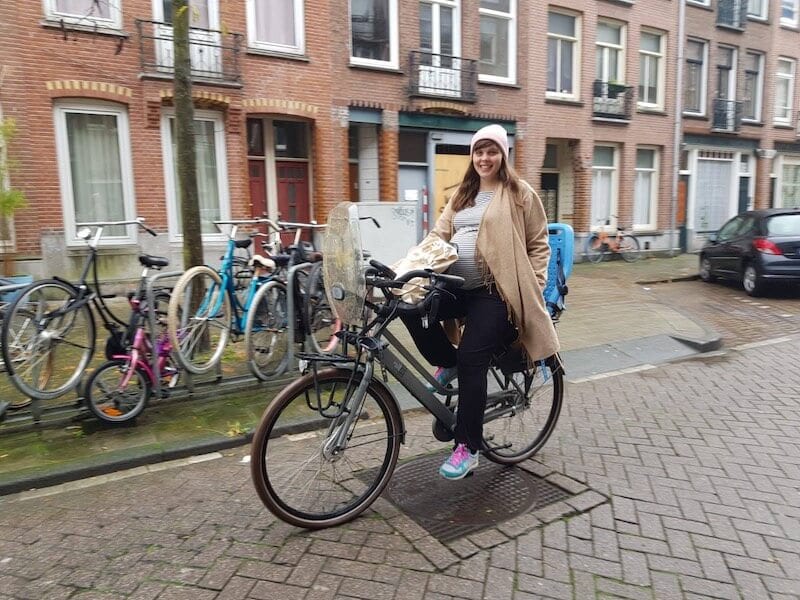
I’m British, my partner is Australian and we are living and raising our two young boys in Amsterdam, the Netherlands.
To say that I get a few confused looks when I explain this to people is an understatement. It’s also true that it gets more perplexing to others when I add that we live in Amsterdam by choice and not because of work or any other commitment because we both work for ourselves. We moved here in the summer of 2013 after two years of nomadic travel, and somewhat bizarrely on the same day in 2015, our first son was born. Our second boy has just turned one year old.
It was very much a conscious decision to start and raise a family in the Netherlands. Firstly, we’d read and seen for ourselves how family-focused life in the Netherlands is and how great Amsterdam with kids is. We noticed a much healthier work-life balance.
Flexible working, part-time hours, working from home and having a day off to be with your kids each week are all well established and much used concepts here. Schools, preschools and daycare centres are very much influenced by Montessori philosophy (indeed, the founder Maria Montessori lived in Amsterdam for many years). You will rarely see any form of helicopter parenting out and about in playgrounds or parks.
Needless to say, the (mostly!) safe cycling is also a huge bonus – we do everything by bike no matter the weather.
For us all these things are important parts of how we want to raise our kids; having lots of quality time during the week, encouraging independence, being active and outside a lot but in a fun, diverse and culturally-rich city. We’re really excited they will grow up bilingual.
My family lives in the UK, so staying connected to them is relatively easy with us going home for a weekend or them visiting us at least three or four times a year.
My partner’s family are in Australia or other parts of the world. That is a bit difficult but we have already done one big Australia trip and hope to do many more as the boys get older.
I think the hardest thing for my eldest son who is now in a Dutch school is that he knows his grandparents and cousins all live far away, while many of his schoolmates see their “Opa’s en Oma’s” much more often. However, we think he also likes the adventure of getting on a plane to go and see them, or to have them come and stay with us.
As with all things, it’s a question of the pros outweighing the cons. We do miss family a lot, and I sometimes worry about my sons missing out on parts of their British and Australian identities. However, the pros of living in the country that apparently has the happiest kids in the world feel much more important!
4. Clotilde from A Princess Travelling with Twins
The flexibilty of expat like in the UK
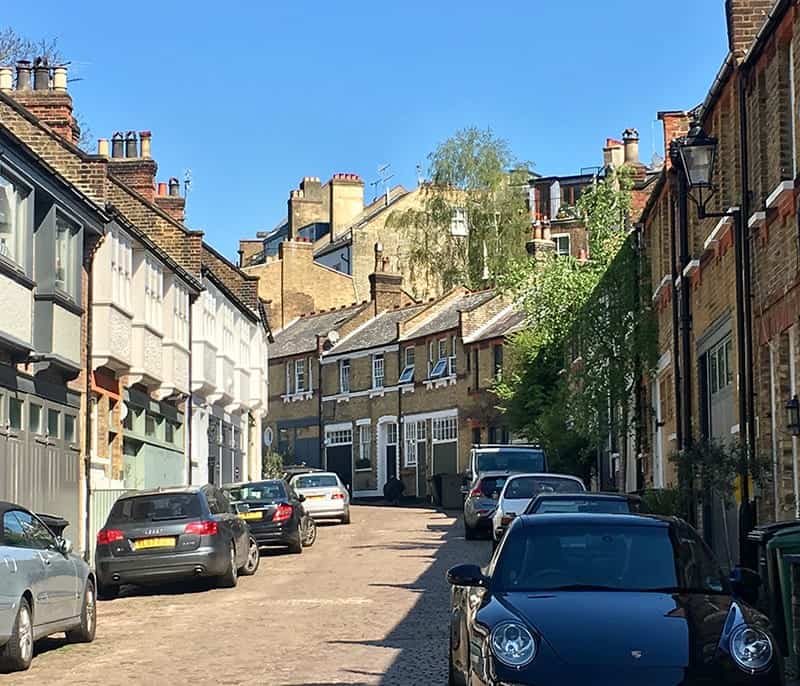
My identical twin boys were born in the UK 3 and a half years ago. I had been an expat for 6 years and thought I knew the system. I thought I had everything under control. I was blissful in my illusion! Ouch!
The British system does not treat pregnancy as a disease (as they sometimes do in Italy) but more as a natural thing. If there are no problems, the tests are sporadic and few. If you can maintain a positive approach, you will have a peaceful 9 months! For me, however, it was almost the opposite. With identical twins, my pregnancy was immediately classified as higher risk. They affixed a red dot to my medical record leading to scans and checks every two weeks at least!
After birth, of course, I had to reorganize my life. Without grandparents and close relatives, the first few months are probably the most difficult. The government helps by offering mothers the opportunity to stay home for a year from work, but the money they receive is very little, and the cost of nursery school is very high!
Many mums leave their jobs either through choice or lack of options, but expat mums have many resources. Not everything is as challenging as it may seem. In the UK, you have the right to make a Flexible Working Request. It doesn’t guarantee acceptance, but many jobs offer flexible hours or the possibility of working a few days from home.
A nanny or au-pair, especially in the case of twins, can prove to be the most flexible and economical solution. For example, if you travel a lot (instead of paying nursery fees and not using them), an au-pair can be a great help, and the children could grow up bilingual!
We’ve discovered a new aspect of magical London. It’s a fantastic city for children, full of playgrounds, and kids activities. It’s easy to move around with the stroller on public transport, and full of family-friendly restaurants! We live in Hampstead, and we couldn’t be happier!
5. Heidi Wagoner from Wagoners Abroad
Technology makes raising multicultural kids easy

We moved to Spain in 2012 thinking we were going to have a 1-2 year sabbatical. Our goal was full immersion for our kids to learn the Spanish language while they were young.
We kept in touch with family and friends via our blog, skype calls and email. They kids kept up with their English, sending and receiving emails from close family members.
After our 2 year mark, we decided to spend a nomadic year and traveled through Southeast Asia. The kids were a little bit older and now and not only needed to stay in touch with friends in the USA, but also in Spain.
This is where we evolved to a little bit of social media for them. The best means to communicate with friends in Spain was with WhatsApp or Instagram. We allowed them to use our phones for this, as they didn’t have their own phones at ages 9 and 11.
As we spent our year nomadic, we met so many people along the way which we bonded with and wanted to remain in touch. Social media became even more important for the entire family to keep in touch. Now it was even easier to “call” people and speak with them using various platforms. At this point we used them all, because in order to keep in touch we needed to be flexible.
Following that nomadic year in Asia we returned to Spain and have been in the same location where we originally started in 2012. Each year, it seems it is easier and cheaper to keep in touch with anyone around the world.
Our kids now have their own phones and keep in touch with their global friends. It is nice to see them keep those relationships and bonds with other kids who’ve had that same global experience. Of course, they also use the social media and messaging apps to keep up with their local friends and family around the world too.
It’s all changed quite a bit over the past 7 years and keeping in touch and communicating is easier than ever.
We are now at the doorstep of our eldest heading off to university, somewhere in Europe. Even though there may be distance between us geographically, we know we are just a message or phone call away. The future for our family is very exciting and we can wait to see it all unfold.
6. Gabi Ancarola from The Tiny Book
Solo-mom in a foreign country raising multicultural kids
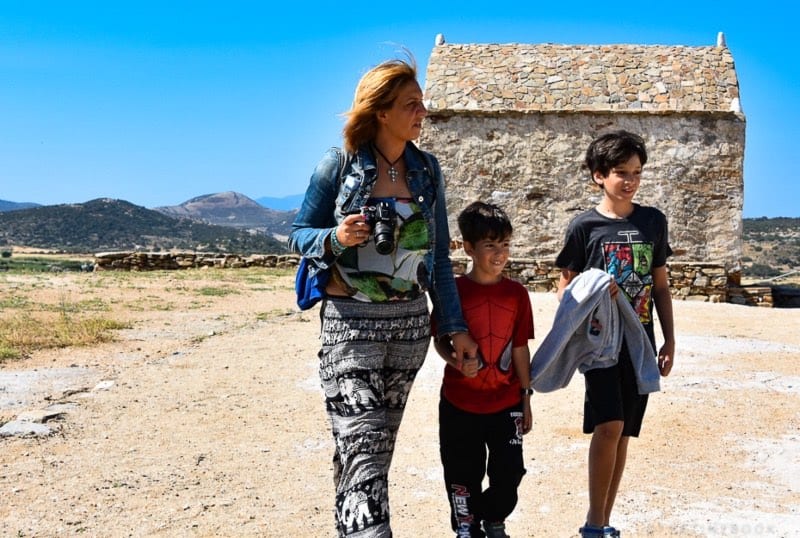
I have a long expat history. Originally born in Argentina, I left my country twenty-something years ago to settle in Italy. There I met my partner and our two kids were born. As a part-time digital nomad, I divided my time between traveling and a freelance career.
After many trips to Crete (Greece), we realized we had fallen in love with the island and that we wanted our life to continue there. It did not take us much to decide to leave everything behind after years in northern Italy. Everyone was happier to move to a warmer country.
Since the beginning things went well. The kids had no problem adapting, and after some months of home schooling, they decided they wanted to give Greek school a try. We couldn’t afford a private school so they knew they would have to make an extra effort to learn the language.
It wasn’t easy as they were really on their own. Neither I nor my husband spoke a word of Greek. But that put them to the test, less than six months later both could speak Greek fluently.
Unfortunately, not everything goes as expected.
After some months on Crete, my husband had a massive stroke and passed away. I was now a solo mom in a foreign country.
During the first days I thought it was going to be impossible, but my kids taught me that I had a lot to fight for. I couldn’t give up. They are the reason why I always think positive, despite how awful life might be.
Yes, it’s true that our travels slowed down since then, but we learnt to find the positive of that too. And we don’t miss it. We understand how much more other things count.
My tip (with or without kids) is that it’s up to you give your fiercest fight, but if you do, do it with a smile on your face. Life is worth it.
7. Stefania van Lieshout from her blog
“I underestimated how difficult it is to raise bi-lingual kids”
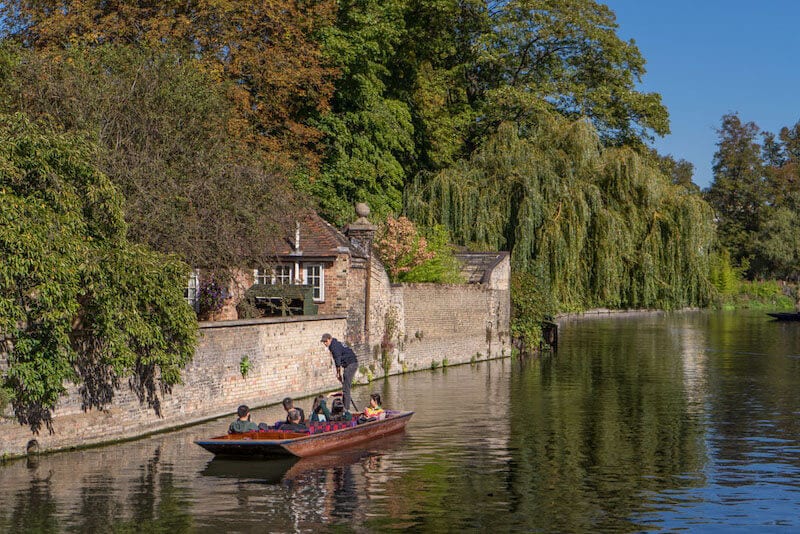
For most of my adult life, I lived overseas.
Born in the Netherlands, moved to the UK as an expat, then Syria, Oman, Malaysia, two years back in the Netherlands and Russia. After our last posting abroad, we decided to quit our jobs and work as digital nomads, meaning we could live everywhere. We immigrated to Spain where we lived for ten years and this summer we moved to the UK.
Our eldest son is now at university in The Netherlands, and our youngest child is in his final years of secondary education.
What I underestimated is how difficult it is to raise bi-lingual kids. In our case, Dutch and English and later Spanish. So, three languages.
The children attended international schools, where English was the primary language. They both finished the Dutch primary curriculum, as well as the international one. Secondary education was in English and Spanish. It sounds easy, but in reality, it takes a lot of work from parents, teachers, and children to learn these different languages.
The effort is worth it in the end, but no matter what some people claim, it is not easy. There is additional homework, reading, and sometimes resistance from the children. Especially at a young age – they don’t see the point of all this extra effort on top of their regular homework.
8. Catherine Jordan from Passports and Adventures
Kids are resilient, it’s the adults that struggle
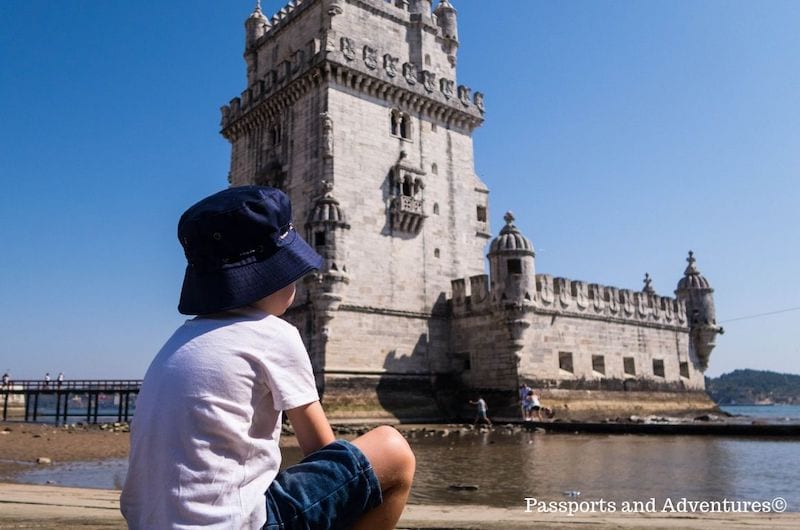
My husband and I became expats 15 years ago when we left Ireland for the UK. During that time, our son came along and it became important to me to connect him with Ireland and our family there. As a result, he and I return at least once, often twice a year, with one trip generally lasting more than a week.
When you don’t have family around you, it can be hard as parents with no support network. And as an expat, you can sometimes feel like you don’t really belong anywhere which is why it’s become important for me to ensure he connects with Ireland.
Two years ago, we moved to Portugal to join my parents who were retiring here. We felt it was a great chance to let our son have as much time with his grandparents before it became too late. It also gave him the chance to become bilingual and to have a more outdoor life, which has been a great decision, as he is much healthier for it.
It was tougher on me as a mum, worrying how he would cope, but it’s been no problem for him as he’s still young enough. I take regular Portuguese lessons in order to support him and we use what we know in Portuguese at home.
Kids are resilient and, in my opinion, can adjust to new situations and environments a lot better than us adults, particularly when they are young. They don’t have the same worries and fears as us and for that reason, I think they find the adjustment easier than us. As long as we support them in any way we can, they will be fine.
9. Sally Flint from her blog
Empty nesting as an expat
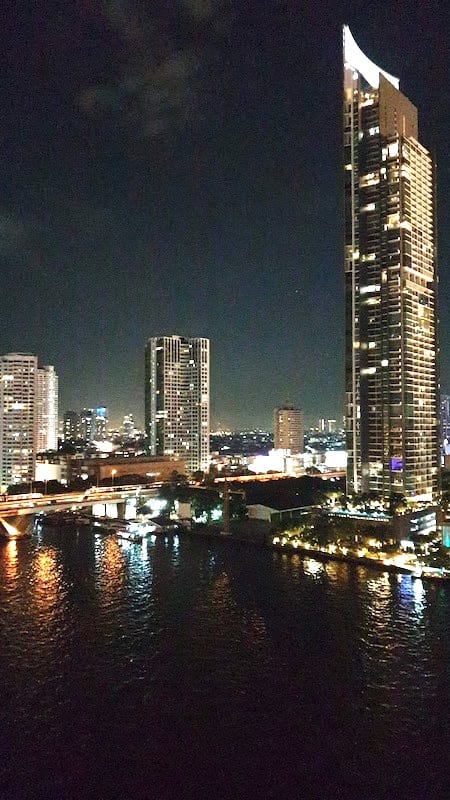
I have lived and worked as an expat teacher and librarian for the last twenty-three years. When I first moved to Tanzania, neither of our children had been born. Now as I write from the position of a ‘trailing spouse’ in Thailand, both children have left home.
Being an expat has provided wonderful educational and travel opportunities for our whole family. Our children have both voiced how privileged they feel to have been brought up overseas with the benefit of an international school education behind them. This was a key reason for living overseas. Our children have been well prepared for handling the downsides of being ‘third culture kids’.
What, as expat parents, we prepared less well for is the huge chasm that the children leaving the family expat home overseas would bring us.
If you find yourself in this situation be sure to consider and create strategies for
- How you and your partner’s own work commitments will impact on helping your child settle at university.
- Who will act in loco parentis should your child be faced with a problem in their home country.
- How you will fill the void of their departure.
- How you will manage ‘closeness’ with your family when time zones may make regular communication difficult.
I would recommend discussing these and many other points with your partner, your children and friends. Forewarned is forearmed and it will help you prepare for and handle your own parental ‘third culture’ separation from your children.
10. Clare Dewey from Epic Road Rides
Moving to Paris with kids
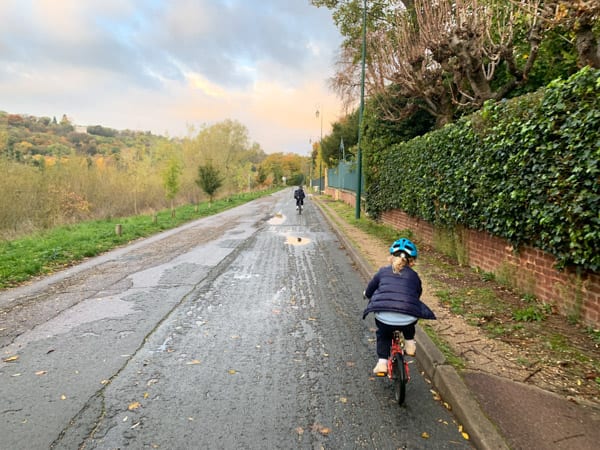
In August 2019, I moved from the UK to just west of Paris, France. I moved here with my husband and two young children. This is our first move abroad and, despite not being far from home, it felt quite a jump since we’ve left parents, friends and a home we loved.
We’re now in a fabulous spot on the River Seine, just 15 minutes to the Champs Elysee by overland train. Yet we are part of a village with a twice weekly market and two boulangeries on the high street. We have also been able to ditch the car ride to school and cycle along the river path to school instead – which is fantastic!
The house we live in here is quite a bit smaller than our house in the UK and I’m so pleased we did a lot of throwing away before we left. I had somehow managed to hang onto far too much in the way of baby clothes and games and I would have been so cross if we’d paid to move all that stuff over here. So definitely have a big clear out before you move!
I’d also suggest allowing yourself time to make friends and roots in your new home. I didn’t really think about that before moving and have found it difficult to give myself time to make friends instead of working all the time! It’s a difficult balance to strike and I’ve had to cut back on some of the social activities I took on when I first got here.
However, all in all, living in a new country has been a wonderful experience so far and I’m really pleased we took the plunge.
11. Sandra Muller from The Smarter Writer
Digital plonker raising a multicultural kid in Korea
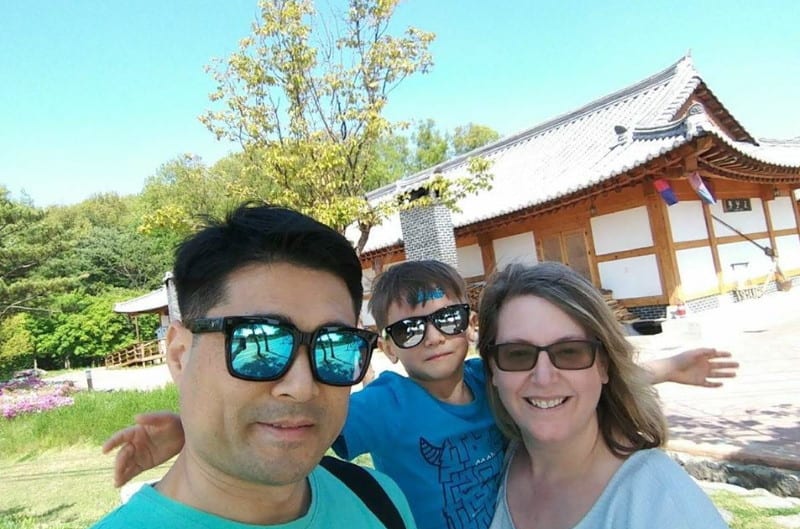
I failed at being a digital nomad.
I moved to Vietnam with my husband and then 3-year-old son in 2016. I found out very quickly that I don’t like moving around while I’ve got a tonne of work to fit into my copywriting schedule while also trying to take in the local sights. So, instead of being digital nomads, we became digital plonkers. We plonked ourselves in Nha Trang for almost 3 months. We loved it.
It was long enough to give us a taste of what life could be like without the oppressive rising cost of living in Melbourne. We returned to Australia, sold our house, car and 95% of our belongings and moved to South Korea.
My husband is Korean, so our visa situation wasn’t a problem. Our son also has Korean citizenship and I applied for a family visa. Too easy!
We’ve been here for almost 3 years. We wanted our son to learn Korean, and there is no way that would happen had we stayed in Australia. It was also a chance for him to spend time with the other half of his family and to learn about Korean culture. He is now bilingual but with a preference for Korean. He’s thriving here.
Korea is only an hour or two behind Melbourne, which made continuing to work with Australian-based clients easy. I’ve used tools like Whereby.com and Skype for video chats and GatherContent.com as a collaboration tool when working on projects with a team of writers.
I haven’t found being a remote worker to hinder my business because everything I do is online. My clients have loved what we’re doing and ask me a lot of questions about our experience. They express it’s something they’d love to do one day, too. I think there’s a bit of a digital nomad or a digital plonker in all of us.
12. Jenni from Chilling with Lucas
New expats raising expats
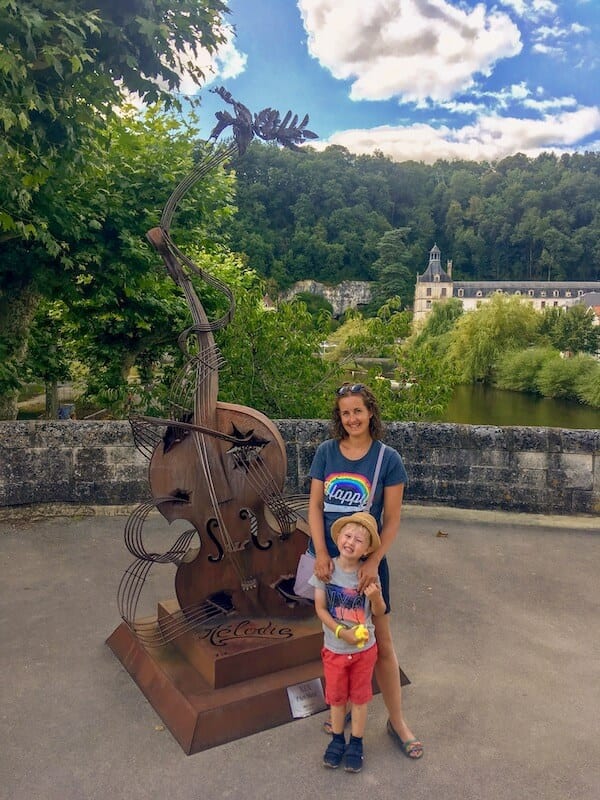
In September we moved to the Dordogne in France.
My son is 4 and was due to start reception class in school in the UK. We registered him in a school once we arrived, but in France, children don’t start primary school until they are 6 years old so he started L’Ecolle Maternelle in France.
Thankfully, this gives him a couple of years to settle into his new life and learn the language before they start teaching him to read and write.
I have been in touch with expats on Facebook. We’ve met up with some that have children so my son can play and chat without a language barrier. I also make sure we explore the area and find places he likes. We have moved to a very rural area so it’s a quiet life. In the UK, we used to go out often, so I don’t want him to think there isn’t anywhere here and start missing home where he had an active social life.
We also FaceTime family on a regular basis so he stays connected with them. I send photo books to my Grandparents on a monthly basis for them to keep up with our activities.
13. Joss from Little Green Globetrotter
Worldschooling their way to multicultural kids

When parents choose to raise their family in a foreign country, witnessing competing cultures battle to become part of their children’s identity is to be expected.
For very young children, it is likely that their main influence is their parents, but as they get older, a child’s circle of influence inevitably broadens, and they’re more likely to adopt the cultural norms of the community in which they’re living.
We’re a family of British expats living in New Zealand. From about age 3, we started to hear Kiwi words and pronunciations creeping into our eldest’s everyday language in place of their British counterparts. ‘Gum boots’ instead of ‘wellies’, ‘togs’ instead of ‘swimming trunks’, the American pronunciation of ‘yoghurt’.
Of course, my husband and I don’t mind this influence; we wouldn’t live here if we didn’t like the culture and if we didn’t expect our boys to adopt it as theirs, but we still consider ourselves British and think it’s important that our children have an understanding of their parents’ cultural upbringing and where they’ve come from.
So, how do you keep a child’s roots present and of value to them while living as an expat?
Undoubtedly, contact with loved ones in the country of origin is important. We video call relatives in London regularly, we enjoy welcoming guests here and we will visit the U.K. as often as makes sense. We hang photographs of loved ones at child-height at home so that faces are familiar and can be looked at whenever they wish, without the need to ask for our phones.
We celebrate cultural festivals, talk about British current affairs and read books set in the U.K..
Food, art and music can all be introduced from a young age; teach them to make Great-Granny’s handed-down recipe and share it with their friends, play them the music you grew up listening to and loved, introduce them to your country of origin’s architecture, history and natural landscapes.
As worldschoolers, I hope that our boys will take little bits of whatever resonates with them from all the countries and communities we spend time in, and create a blend, a cultural mish-mash, that suits them and their future families. My job is simply to make these cultural insights accessible to them.
14. Karen Bleakley from Smart Steps to Australia
“We wanted them to grow up to have the confidence to follow their dreams – even if they do seem big and scary.”
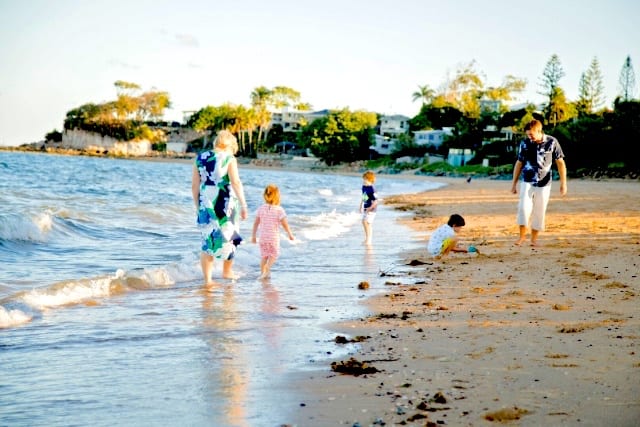
I moved to Australia from the UK five years ago with my husband Matt and three kids who were 2, 4 and 4 at the time.
Just before our twins were born, Matt and I backpacked around Australia and we fell in love with it – it offered us the outdoor beach lifestyle and year-round sunshine that we both loved. We decided to start the visa process as soon as we got home, but then we found out we were expecting twins. That changed everything. We spent the next five years wondering whether to stay or go.
When you have kids, it makes moving abroad much harder. We had to come to terms with the fact we’d be taking them away from their grandparents and their cousins. It was also difficult because we had a family member who really didn’t want us to leave.
A few years passed and we finally made the decision to apply only to find out Matt’s skill was being removed from the skills list. This could have put a stop to our dream but luckily we found out he qualified for another occupation on the skills list thanks to him having a variety of qualifications and work experience.
My tips for families in a similar situation to us is to think about the big picture. Try to think ahead – how will you feel in ten years from now if you don’t give it a try? Or in 20 years? What opportunities are you hoping to give your kids? What example do you want to set for them?
We knew that we wanted our kids to travel and explore the world and we wanted them to grow up to have the confidence to follow their dreams – even if they do seem big and scary.
The most important thing to be aware of is that if you’re eligible for a visa for the country you want to move to, then you need to apply right now. Don’t wait and think about it as the opportunity could be gone forever tomorrow as visa rules change all the time. We came very close to missing out and it would have been our fault for spending so long talking about it instead of actually taking action!
15. Nadine Maffre from Le Long Weekend
From nomads to planting roots in Provence
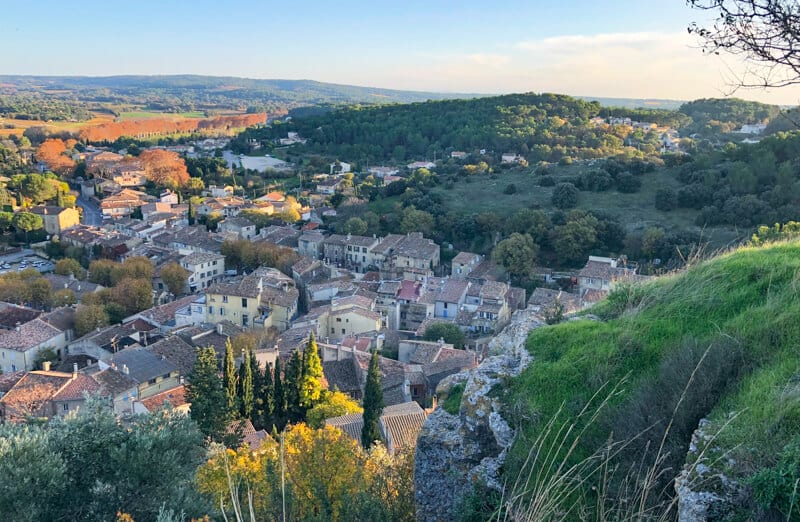
We decided to make the move from New Zealand to France when our son had just turned 3.
He’s now almost 7 and we have moved around 10 times in the last 3.5 years, so in a way, nomadic living has been the only way of life he has known. The most important lesson we’ve learned in all that time, is that as flexible as they may seem with all the chopping and changing, kids (in general) really crave a stable home life and the routine that comes with that.
It’s this realization that led us to buying a house in Provence earlier this year and finally putting down roots.
Despite all the moving, our son has been able to attend the same school for the last two years (minus a few months off for travel in between). We found the Steiner-Waldorf pedagogy (which focuses on imagination and creativity) more in tune with our way of parenting than traditional French public schools. They’ve also been more flexible with us taking him out of maternelle (kindergarten) to go travelling.
However, now that he’s started primary, taking time off isn’t as straight forward – another reason for us to finally ‘settle’ somewhat and allow him to have a routine with his school and friends.
Another thing we love about his school is the fact it is a very international school. Our son has 7 different nationalities in his class of 9 kids! So that’s really opening his eyes to other languages and customs in the most natural way possible – through play!
16. Susannah from The O’Briens Abroad
Traveling full-time with a son with ASP
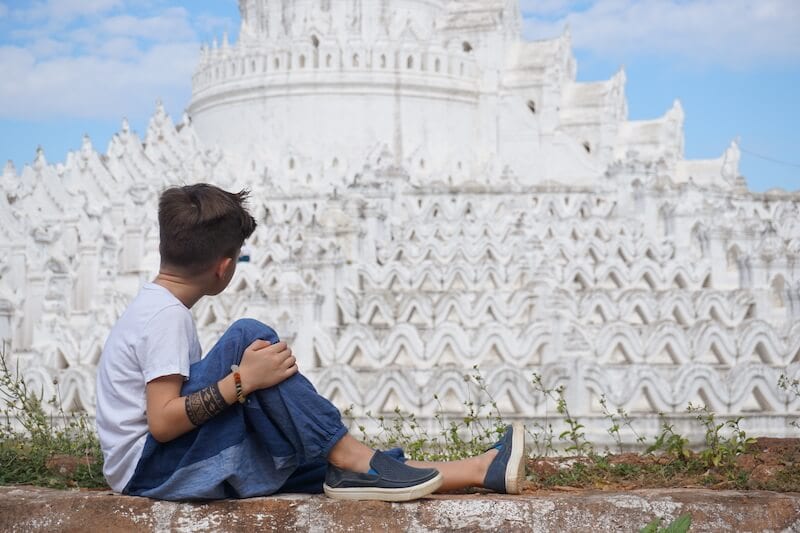
It felt like the entire world tried to warn us not to travel full-time with our 5-year-old son.
He had been diagnosed with Sensory Processing Disorder and displayed other traits aligning with Autism Spectrum Disorder, and we were warned that a life on the go would interrupt the need children with ASD have for consistency.
Well, after two years of constant travel, I’m proud to say that my son has thrived on our lifestyle!
Parenting a special needs child while traveling full-time does present some challenges, but with some creativity and patience we are able to live our dream and help our son grow.
While we must constantly stay vigilant of our son (who is prone to such bouts of concentration that he is completely unaware of his safety and the world around him), maintain as strict a daily schedule as possible, and seek out opportunities for him to be social with other children and adults, traveling full-time has allowed him to figure out who he is and how he learns best without the constant advice of other people.
He is free to love the colors, shows, and toys he chooses without the threat of being judged by other children. He’s able to try a variety of new foods to decide which flavors and textures he likes best. He has more opportunities to practice his social skills by constantly interacting with new people, wait staff, sales clerks, and others we meet along the way.
By being forced to adapt to new circumstances he is able to experiment and grow as a person more than I believe he’d be able to if he were being raised in the same community. And I, as a mom, and able to grow by seeing his example of strength!
17. Ariana from World of Travels with Kids
Raising a half Australian/half Nicaraguan, Peruvian born daughter in Peru
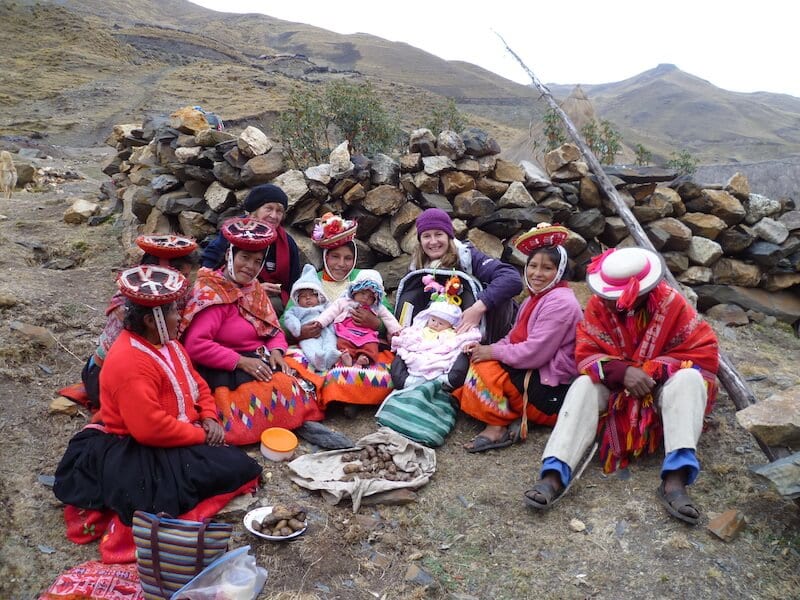
Our first daughter was born in the high Andes city of Cusco, Peru.
I’m Australian, but Cusco had been my base for my travels of Latin America for close to a decade. After meeting my partner (and father of the children) in Nicaragua, he later made Cusco his home and we became Peruvian residents. There is no question in our mind that we would raise our half Australian/half Nicaraguan, Peruvian born daughter in Peru.
She had other ideas from the beginning.
She was an unsettled baby and it was a shock for us. In addition, I realised that it was hard to trust local wisdom, as it was very different to my culture. Our first trip to Australia with the baby brought up other realisations, including that there was organised support for child rearing (mothers groups and the like).
Despite her poor sleeping habits, we travelled a lot in her first two years – Australia, Peru, Nicaragua, and stints in Costa Rica. I was close to a digital nomad, though it wasn’t called that back then!
After much soul searching we moved to Australia permanently, and our son was born. I tried twice more to spend longer periods in Peru with my daughter at a bilingual school; it just didn’t work for her.
When she was 6, I finally accepted that we weren’t going to be an expat family. It made my daughter very unhappy to miss school and then took her months to recover.
She is now 9 years old and in the past few years we’ve taken a number of short holidays and while she still isn’t an enthusiastic traveller she accepts that her mother is!
Each child is different and I can see why connection and belonging are important for my children. I’ve had to adapt my own dreams to one that includes their needs. I still have 100% location flexibility in my work, so I still hope that one day we can do more extended travelling and world schooling with the kids.
18. Keri from Our Globetrotters
Aussie/British by blood, Abu Dhabi by location
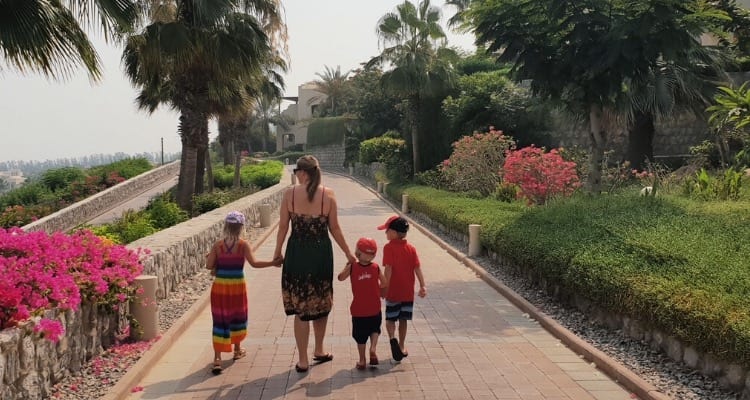
In 2012, we moved to Abu Dhabi in the UAE with our 2 year old and a newborn. They were joined by their little brother in 2014. Although Aussie/British kids by their passports, they have never really known any other life than being expat kids.
They live in a hugely multicultural community which has exposed them to many different cultures, customs, and practises. Religion and ethnic background are very openly discussed at the lunch table among kids. They have a huge appreciation of everyone’s similarities and differences, knowing there is no right or wrong, just different.
We have also travelled extensively around the Middle East region. It has given them great exposure to the differences between rich and poor, the big cities and privileges, versus the Bedouin way and a simpler life.
Despite this exposure, it’s still a slow awakening for them that they lead an incredibly special and privileged lifestyle. I feel there is still very much a need to keep our expat kids grounded. They get spoilt to the luxury of home help, fancy hotels, and readily accessible amenities if they don’t travel beyond that expat bubble.
We travel home to family at least once a year, where they stay “on the farm” with grandparents. They run around outside climbing trees, getting dirty, and playing in the rain as kids should, but also living without some of the luxuries they have gotten used to. That said, most Australians lead an incredibly privileged life too!
I think it’s incredibly important to keep talking about our differences. The issues that matter within their small universe, as well as those that matter on a global scale (when they are emotionally ready to handle this). Strangers are often really surprised at the maturity our children display, and I only hope this will continue and improve as we continue to lead an expat life.
Final Thoughts
Even though we don’t have children, if we did, we would want them to be multicultural kids. I have a lot of admiration for parents who raise their kids away from their home country. It isn’t the easiest path but it is certainly a rewarding one.
Want more info on expat life? Read Life as an Expat: What You Need to Know, How to Be an Expat: Tips from the Pros, and Expat Life: How to be a Happy Expat.
What do you think? Would you raise your kids overseas? Tell me in the comments!
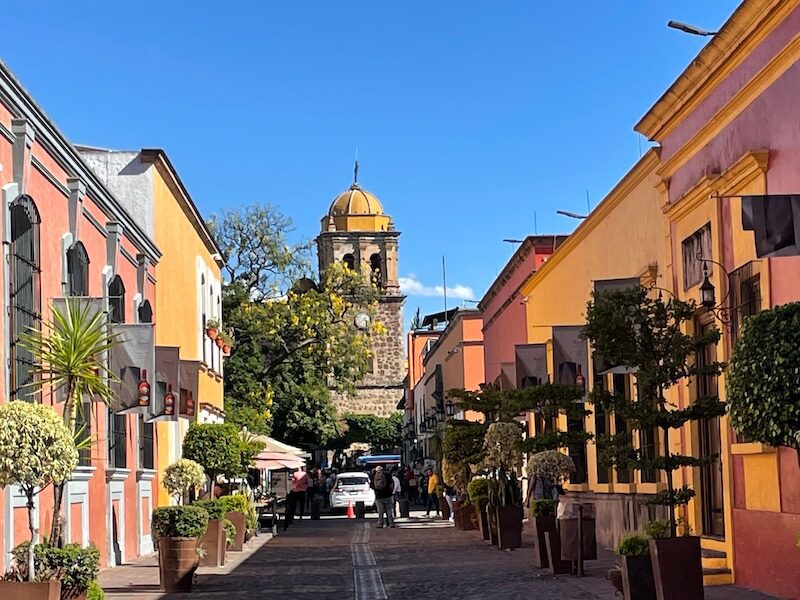
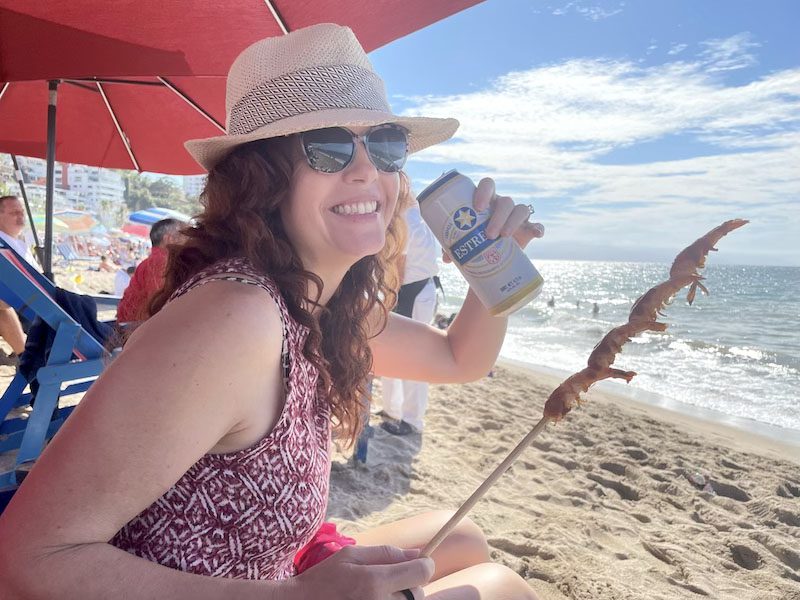

Great post as always Kirsten, you managed to get so many contributors that its a really interesting and balanced perspective. I think it’s so important for kids to travel as much as possible, I was lucky enough to do so and it definitely gave me a more rounded upbringing – and a love for the nomadic lifestyle I now live!
Thank you, Wendy! I totally agree. If I were a mom, I’d be dragging my kids around the world! We didn’t travel much growing up. When we did, it was mostly weekend road trips, and I cherish those memories. Wish I had more!
XO,
K
I’m a so single south African mother living in Vietnam with my two children and they love it would trade this experience for anything
Hi Rachel! Thank you for reading my blog! What an experience you are giving your children!
BTW-I lived 2 years in Cape Town over 25 years ago. I want to go back so badly, but I’m fearful of how much it has changed.
If you ever come this way, let me know! Let’s meet for coffee!